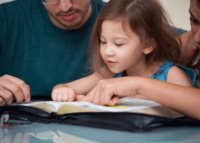Self-esteem vs. self-respect

“Mirror, mirror on the wall, who’s the fairest of them all?”
Just like the Queen in Snow White, we hope to find answers in our mirrors of self-esteem. But the longer we look, the more lost we become.
As a society, we’ve been esteeming ourselves for more than 50 years, becoming more disrespectful, greedy, and entitled as a society than the day we first became infatuated with ourselves in the mirror.
Look in a window, not a mirror
In the mirror of self-esteem, children become consumed in self-conceit or self-consciousness, which leads to hopelessness because they can’t see the possibilities of who God created them to be. But if we take the mirror out of their hands and redirect their attention to the window of self-respect, they catch a glimpse of themselves, but see beyond themselves to find God’s purpose for their lives.
When parents lead children to see the world through a window rather than a mirror, they teach children to focus on others, how others feel and what others need. When children look through the window, their own image is reflected back to them in the glass, but it’s in the appropriate context, as part of the world, not the center of the world.
When your children look past themselves, not only can they see others, but they can also find God’s purpose for their lives. They find respect for themselves as children of God, and this enables them to step into the world beyond the window to love others as they have been loved.
At the window of self-respect, children look for ways to serve others rather than waiting for someone to serve them, as they do in the mirror. They discover “life is more about others and less about me.”
f we don’t empty our children of self-centeredness, which is our duty as parents, not only will they be intolerable to live with, but they’ll also never become mature adults.
The defining difference
Self-esteem is “me-centered.” Self-respect is “others-centered.”
When you encourage your child to focus on how their actions affect others, each act of selflessness deepens their self-respect. Here are four ways to nurture an “others-centered” perspective in your child’s heart at any age:
- Assign chores that allow your child to be of service to the family.
- Encourage your child to praise the accomplishments of others.
- Add “Find someone to help today” to your parting words when you send your child off to school. At night, ask, “Who did you help today?” Take time to listen and respond.
- Teach your child “The Ruby Rule”–Respect others the way you want to be respected.
With honesty and consistency, you can fortify your child’s heart with self-respect that is grounded in Truth and sustained with moral wisdom. You’ll help your child learn that the greatest joy of life will not be found in what they receive, but in what they contribute to the lives of others.
When you build self-respect, you equip your child to become a disciplined, caring, productive, and respectful adult who will lead their generation in the right direction.
(1 Peter 5:5-6, Colossians 3:13-14, Philippians 2:3-4)
Consider a few extra resources:







